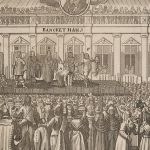Oliver Cromwell was a country gentleman who became a soldier, statesman and finally Lord Protector of Great Britain. As MP for Huntingdon and then Cambridge, he was an outspoken critic of Charles I. His military skills and God-fearing tenacity were decisive factors in the Parliamentarian victory in the civil wars, and he was prominent among those who first treated with, and then executed the King in 1649. He achieved military success in Ireland in 1649 – but carried out brutal massacres. He led the New Model Army to victory against the Scots and Charles II in 1651. Emerged as a head of state when the ‘Rump’ Parliament was dissolved in 1653, and created Lord Protector. He refused the crown in 1657, dying in 1658. Reference: The National Portrait Gallery.
CROMWELL, OLIVER Document signed (Oliver P[rotector]), manuscript warrant in a secretarial hand, dated 1 April 1657 at White… , manuscript warrant in a secretarial hand, dated 1 April 1657 at Whitehall, addressed to Joseph Almond, Thomas Chesham, Thomas Cowell and William Naylor. Single page on folded sheet, 11 3/4 x 8 inches (30 x 20.5 cm). 15 lines in secretarial hand in a dark brown ink with Cromwell’s signature at the head and the name of the addressees at the foot. Minor toning, folded in fours horizontally at an early date, remains of a guard on the verso of the conjugate sheet, but generally in excellent condition, framed with an engraved portrait of Cromwell. Cromwell’s signature is, as usual, slightly palsied, as he was suffering from the malaria that he contracted during his ruthless Irish campaign of 1649-1653. In November 1649 he had been afflicted with what was almost certainly a malarial fever, and he was to die in 1658, the year after this document was prepared, from complications of that illness. This interesting warrant documents the seizure of “quantities of Gold and other things at ye Downes [the stretch of sea off Dover] in several ships bound for the East Indyes, as being designed to be exported out of this Commonwealth contrary to Law”… It further details the arrangements that were to be made for an inventory to be taken by Captain Rolt (presumably Thomas Rolt, later knighted under James II, an official of the East India Company) and Mr. Jessop (likely William Jessop, of the Council of State), as well as the ultimate disposal of the goods “to see ye same delivered to the Commsrs. of the Customs”… This may be an implementation of the Navigation Act of 1651, which was designed to address the Dutch dominance of naval commerce, though seizures under that Act were primarily directed against foreign vessels involved in importing, not exporting goods. Perhaps not coincidental to the events noted in the document, Cromwell renewed the Charter of the English East India Company in October of 1657, having declared it invalid in 1653, (thereby he opened up the trade to all comers). The result had been a financial and diplomatic fiasco that proved very costly to England, and the seizure documented here may be seen as Cromwell attempting to discourage rivals to the Company. In any case, this warrant contains interesting insights into the thorny relations between Cromwell and the East India Company, in the year before his death.
Sold for $6,250 (includes buyer’s premium) at Doyle in 2014
Oliver Cromwell after 1653 Jan van de Velde IV Dutch Not long after Cromwell’s Puritan minority overtook the throne of England, the “Lord Protector” himself was portrayed steely-eyed and dressed in armor. His costume suited well the leader of a fanatical army and a staunch defender of colonial possessions. The portrait is one of the earliest known etchings to be modeled with aquatint.
Reference: The Metropolitan Museum of Art
Oliver Cromwell by Pierre Aubrey line engraving, mid 17th century 6 1/8 in. x 4 5/8 in. (156 mm x 116 mm) plate size Given by the daughter of compiler William Fleming MD, Mary Elizabeth Stopford (née Fleming), 1931
Reference: National Portrait Gallery
Pierre Drevet, 1663-1738 OLIVER CROMWELL; THOMAS FAIRFAX two eighteenth century portrait engravings, in matching oak frames Quantity: 2 one 22 by 16cm.; 8¾ by 6¼in.; the other 30 by 18cm.; 11¼ by 7in.
Sold for 240 GBP at Sotheby’s in 2006
This print is an engraving. The image is made by cutting lines into the surface of a flat piece of metal, inking the plate and then transferring the ink held in the lines onto a sheet of paper.
Subjects Depicted It is a plate from the book Parallelum Olivae nec non Olivarii… (1656), by Louis de Gand. The book contains 13 essays on Oliver Cromwell praising his mercy, benignity and wisdom. The print shows Cromwell on horseback, dressed in armour, at the scene of a battle. This image follows the pose used by the Spanish painter Diego Velasquez (1599-1660) in his equestrian portraits, in particular of the great minister, the Count-Duke of Olivares. Cromwell is explicitly presented as a military leader in this image.
The background of the print touches on the realities of warfare. Smoke from artillery firing from high ground can be seen in the background left and right. In the middle distance troops are drawn up in pre-battle formation and in the near distance, in the plain below Cromwell, the chaos of hand-to-hand fighting is depicted. On the left is a cavalry skirmish and on the right a clash of pikeman. Some indication of the injury, suffering and death that accompanies war is given by the bodies strewn across the battlefield.
People By 1656, when the book was printed, Oliver Cromwell was clearly established as Head of State. There were several laudatory collections published during this period celebrating his great achievements and wisdom.
1656 (made) Artist/Maker: Faithorne, William (engraver)
Reference: © Victoria and Albert Museum
RARE, CONTEMPORARY, GRAPHICALLY ILLUSTRATED BROADSIDE OF THE EXECUTION OF CHARLES I. Historische Erzehlung von Geburt Leben und Tod des weiland dnrchleuchtigen … Carl Stuarts, Konigs in Gross Britanien. Strassburg: Peter Aubri, [1649]. Broadside. Folio (570 x 307 mm). Wood engraving of the exectution of Charles I (image 180 x 282 mm). Two sheets joined (later), the engraving with ironed fold marks, and wax remnants to verso, the broadsheet ironed.
CONTEMPORARY ENGRAVING OF CHARLES I EXECUTION, shown in graphic detail with the Banquet House foregrounded by the scaffold, the head of Charles being help up for the crowd below, and inset oval portraits of portraits of Thomas Fairfax, Charles, and Oliver Cromwell. There are few English illustrated news broadsides from this period; a German imprint is the only way to acquire this iconic image.
Sold for US$ 1,657 (£ 1,269) inc. premium at Bonham’s in 2019
![CROMWELL, OLIVER Document signed (Oliver P[rotector]), manuscript warrant in a secretarial hand](https://antiquevintageprints.com/wp-content/uploads/2020/02/oliver-cromwell-document-150x150.jpg)







